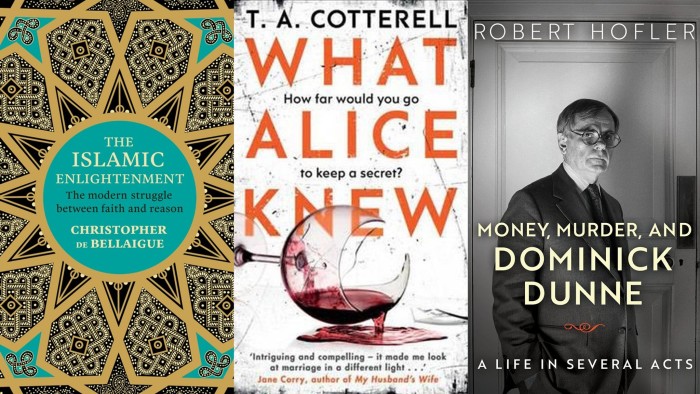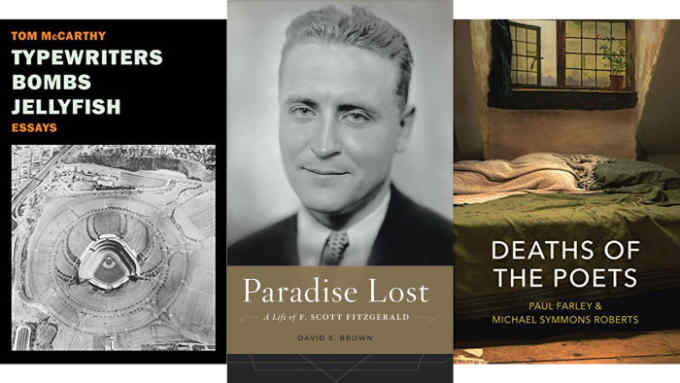Summer books of 2017: readers’ picks

Simply sign up to the Life & Arts myFT Digest -- delivered directly to your inbox.
If you have a book to add, feel free to share it in the comments below.
The Islamic Enlightenment: The Modern Struggle Between Faith and Reason
by Christopher de Bellaigue. Bodley Head £25/Liveright $35
“Stop calling for a Muslim Enlightenment,” Christopher de Bellaigue wrote in a Guardian long read. This is more than the usual truism about those advocating extreme or political Islam; in his book de Bellaigue shows how the Middle East has already been actively engaging with Enlightenment ideas for the past 200 years. Science, feminism and the constitution are not new phenomena. Starting with Napoleon’s invasion of Egypt in 1798, The Islamic Enlightenment charts the history of how these ideas interacted with the Islamic world in the 19th and 20th centuries. We see Cairo’s first modern medical school in the 1820s, Istanbul’s first independent newspaper in 1860, and the creation of Iran’s first constitution in 1906. We meet a number of colourful figures, such as Mirza Saleh, a young Iranian sent to London in 1815, who brings back a printing press and documents his experiences in his travelogue (de Bellaigue notes amusingly that at dancing parties “mention of cider is suspiciously absent — they drink only tea”.) Above all, The Islamic Enlightenment rejects the narrative that the Middle East has simply failed to engage with “modern” ideas. It is excellent reading for anyone interested in understanding the Middle East today and in history.
Edward Davenport, London
The Daughter of Lady Macbeth by Ajay Close. Sandstone Press £8.99
Exploring the darkness and light within, author Anjay Close effortlessly evokes depravity and virtue in this suspenseful read. Victoria Clifford, Reigate
What Alice Knew by T A Cotterell. Black Swan £7.99
A fantastic debut novel, this is not just a psychological thriller but also an uncomfortable examination of close family day-to-day relationships. It is extraordinary that a male author can write with such elegance in the voice of the central female character. The plot is unique, riveting and so believable. And the ending is, well, simply brilliant.
Robert Miller, London
From Great Depression to Great Recession:
The Elusive Quest for International Policy Cooperation,
Edited by Atish R Ghosh and Mahvash S Qureshi. International Monetary Fund $27
In January 2015, the IMF conducted a symposium titled From Great Depression to Great Recession: The Elusive Quest for International Policy Cooperation. The book of the same title, edited by Atish R Ghosh and Mahvash S Qureshi, is a compilation of 17 papers and a foreword by David Lipton, the IMF’s first deputy managing director. Chapters are contributed by prominent central bankers, economists and economic historians including Paul Volcker, Maurice Obstfeld, Catherine R Schenk, Edwin M Truman, James Boughton and Harold James. In his preface, Lipton draws parallels between the Great Depression and the Great Recession: a rise in populism, nationalism and extremism — arising from unemployment, economic frustration and social tension. Secular stagnation, a phrase coined by Harvard professor Alvin Hansen in 1938, was used by Lawrence Summers in 2014. The currency wars of today resemble the currency depreciations, exchange rate restrictions and trade barriers of the 1930s. With monetary policy at its limits, fiscal policy hobbled by high debt and political constraints, it becomes very tempting to boost aggregate demand through currency depreciation.
Srinivas Voruganti, New Delhi
Money, Murder, and Dominick Dunne: A Life in Several Acts
by Robert Hofler. University of Wisconsin Press £28.50/$26.95
In a compelling new biography that is as breezy as it is revelatory, Robert Hofler carefully traces the epic scope of Dominick Dunne’s life, with the careful appreciation for detail, colour and gossip that Dunne demonstrated in his legendary coverage of the crimes and scandals of the rich and famous. Shawn Pasternak, Washington, DC
You Don’t Look Your Age . . . and Other Fairy Tales
by Sheila Nevins. Flatiron Books $24.99
This humorous rant of a book by 78-year-old Sheila Nevins covers the indignities of ageing, the challenges of being a woman in a man’s world, and how few old lady role models there are . . . Lois Mateus, Harrodsburg, Kentucky
Camels, Tigers & Unicorns: Rethinking Science & Technology-Enabled Innovation by Uday Phadke and Shailendra Vyakarnam. World Scientific £98/$118
A great summary of the structures, processes and mechanisms involved in turning scientific ideas into commercially valuable propositions.
Victoria Lebedeva-Baxter, Cambridge
Finance for Normal People: How Investors and Markets Behave
by Meir Statman. Oxford University Press. £27.22/$34.95
Finance for Normal People is about real people making investment decisions. Its author, Professor Meir Statman of Santa Clara University, is one of the pioneers of behavioural finance, which is really a useful combination of economics and psychology. His book combines theory and practice in an understandable way, not aimed solely at academics and professionals. What I like most about Statman’s approach is that he does not take sides, promoting behavioural finance to the detriment of standard finance. Instead, he compares and contrasts the two, but ultimately leans towards whichever better describes human behaviour. In his own words; “it is models that must conform to people, not the other way around”. Yet this is no “how to invest in the stock market” manua; instead it is a readable book of applicable findings from behavioural finance particularly for thosewho take long-term investing seriously. Mehmet Gerz, Istanbul
Move Fast and Break Things:
How Facebook, Google, and Amazon Have Cornered Culture and What It Means For All of Us by Jonathan Taplin. Macmillan £18.99/Little, Brown $29
An honest albeit opinionated look at the monopolies enjoyed by Amazon, Facebook and Google, mixed with enough intrigue in the form of the rightwing libertarian philosophy of Thiel and co. The author’s background as a rock tour manager for Bob Dylan and the Band lends the book an “against the man” flavour, but the facts are undeniable and well researched. Taplin is very good at exploring ties between the businesses and the government, and offers insight as to how this unregulated monopoly is skewed to the 1 per cent of “content generators” as today’s artists, writers and great creative folk are known. Salil Bhargava, Ahmedabad
Isabella of Castile: Europe’s First Great Queen
by Giles Tremlett. Bloomsbury £25/$35
Tremlett, a journalist who has been a long-serving correspondent in Madrid, vividly plunges the reader into the turmoil of 15th-century Spain and the unbelievable success of Isabella. Rima Scott, Buckingham
Adults in the Room: My Battle with Europe’s Deep Establishment
by Yanis Varoufakis. Bodley Head £20
An excellent memoir and review of key issues at the core of the European Union by someone of a rare integrity who stood by his views. Gabriela Soppelsa, New York

Comments